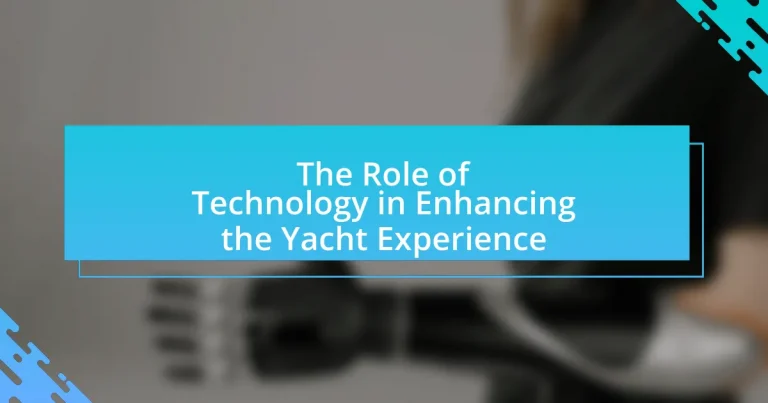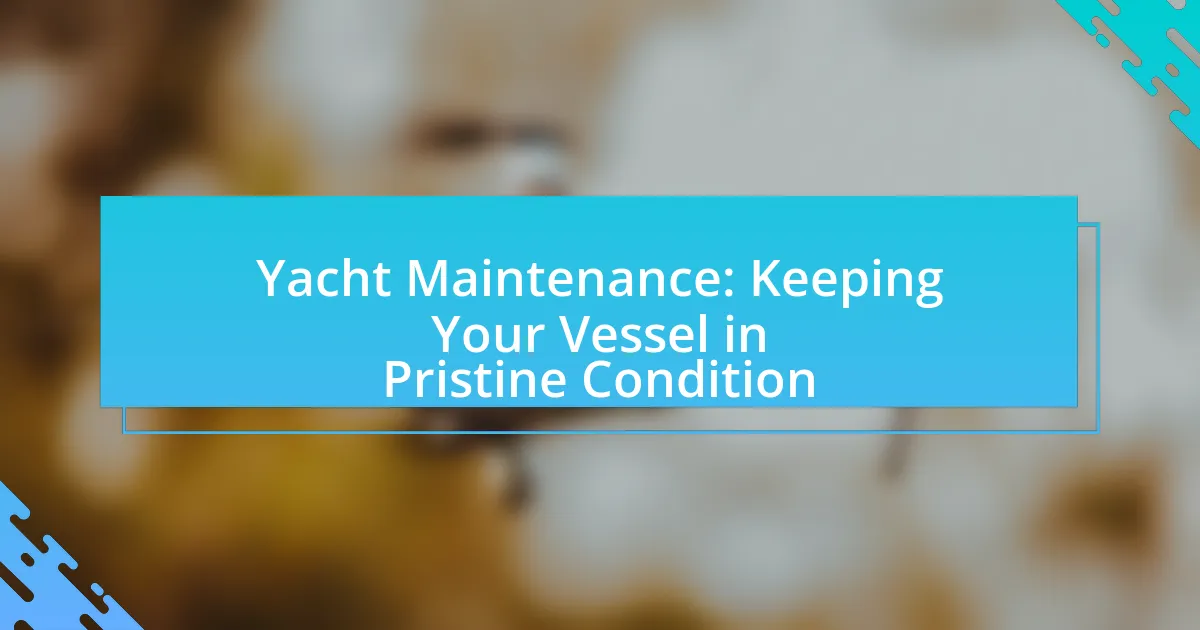The article focuses on the role of technology in enhancing the yacht experience, highlighting advancements in navigation systems, communication tools, and onboard amenities. It discusses how modern yachts utilize GPS, autopilot, and satellite communication to improve safety and connectivity, while smart home technologies enhance comfort and convenience. Key technological advancements in yacht design, including eco-friendly propulsion systems and automation, are examined for their impact on performance and sustainability. Additionally, the article addresses how these innovations contribute to guest enjoyment, operational efficiency, and overall safety, while also exploring future trends in yacht technology, such as artificial intelligence and sustainable practices.
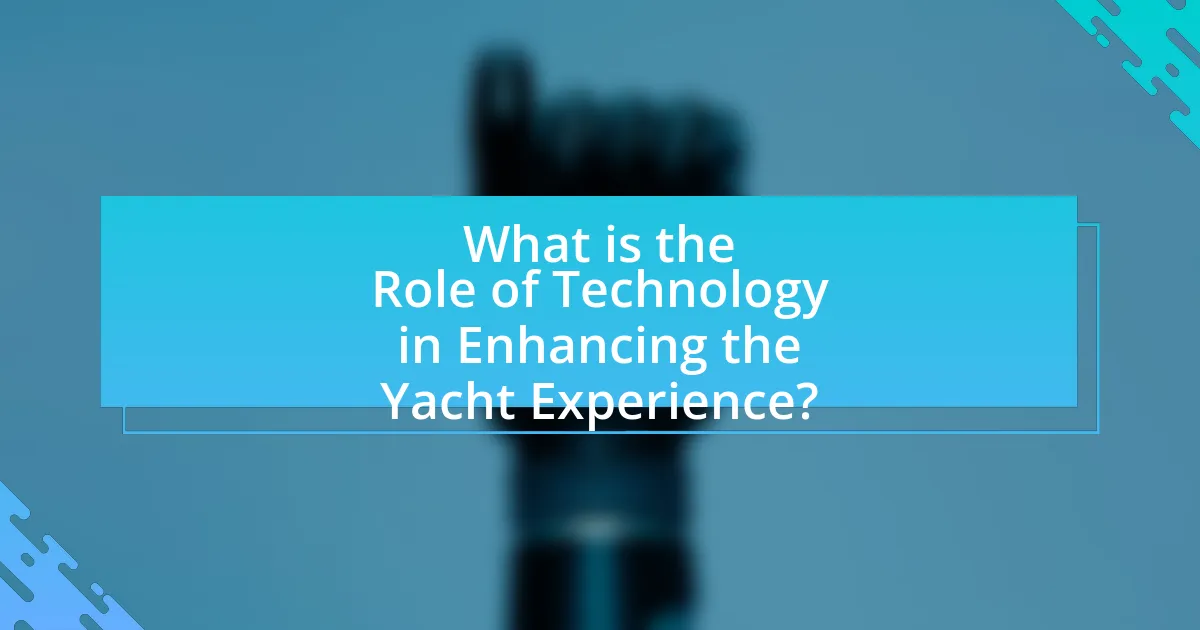
What is the Role of Technology in Enhancing the Yacht Experience?
Technology plays a crucial role in enhancing the yacht experience by providing advanced navigation systems, improved communication tools, and luxurious onboard amenities. Modern yachts are equipped with GPS and autopilot systems that ensure safe and efficient navigation, allowing for precise route planning and real-time adjustments. Additionally, satellite communication technology enables seamless connectivity, allowing yacht owners and guests to stay in touch with the outside world, access entertainment, and manage onboard systems remotely. Furthermore, smart home technology enhances comfort and convenience, enabling control of lighting, climate, and entertainment systems through mobile devices. These technological advancements not only improve safety and convenience but also elevate the overall luxury experience on board, making yachting more enjoyable and accessible.
How has technology transformed the yacht industry?
Technology has transformed the yacht industry by integrating advanced navigation systems, automation, and eco-friendly innovations. Modern yachts now utilize GPS and electronic chart systems for precise navigation, enhancing safety and efficiency. Automation technologies, such as smart controls for lighting, climate, and entertainment systems, allow for seamless user experiences and increased comfort. Additionally, the adoption of hybrid and electric propulsion systems reflects a shift towards sustainability, reducing emissions and fuel consumption. According to a report by the International Council on Clean Transportation, the use of hybrid technology in yachts can decrease fuel use by up to 30%, showcasing the industry’s commitment to environmental responsibility.
What are the key technological advancements in yacht design?
Key technological advancements in yacht design include the integration of advanced materials, automation systems, and energy-efficient technologies. Advanced materials such as carbon fiber and lightweight composites enhance structural integrity while reducing weight, leading to improved performance and fuel efficiency. Automation systems, including smart navigation and control interfaces, allow for easier operation and increased safety. Energy-efficient technologies, such as hybrid propulsion systems and solar panels, contribute to sustainability by reducing emissions and fuel consumption. These advancements collectively enhance the overall yacht experience by improving performance, safety, and environmental impact.
How do these advancements improve safety and performance?
Advancements in technology enhance safety and performance in yachting by integrating sophisticated navigation systems, automated safety features, and real-time monitoring tools. For instance, GPS and radar systems provide precise location tracking and obstacle detection, significantly reducing the risk of collisions. Additionally, automated bilge pumps and fire suppression systems actively monitor and respond to emergencies, thereby improving onboard safety. According to a study by the International Maritime Organization, the implementation of advanced navigation technology has led to a 30% reduction in maritime accidents over the past decade, underscoring the effectiveness of these advancements in enhancing both safety and performance in the yachting industry.
What are the primary technologies used in modern yachts?
The primary technologies used in modern yachts include advanced navigation systems, automated control systems, and eco-friendly propulsion technologies. Advanced navigation systems, such as GPS and radar, enhance safety and route planning, while automated control systems allow for easier handling and operation of the yacht. Eco-friendly propulsion technologies, including hybrid and electric engines, reduce environmental impact and improve fuel efficiency. These technologies collectively enhance the overall yacht experience by improving safety, ease of use, and sustainability.
What role does navigation technology play in enhancing the yacht experience?
Navigation technology significantly enhances the yacht experience by providing accurate positioning, route planning, and safety features. Advanced GPS systems allow yacht operators to determine their precise location, enabling efficient navigation and reducing the risk of getting lost. Additionally, electronic chart systems and software facilitate route planning by displaying real-time data on weather conditions, tides, and potential hazards, which helps in making informed decisions while at sea. Furthermore, features such as collision avoidance systems and automated alerts enhance safety, ensuring a more secure and enjoyable journey. The integration of these technologies leads to improved efficiency and peace of mind for yacht enthusiasts.
How do communication systems improve onboard connectivity?
Communication systems enhance onboard connectivity by providing reliable and high-speed internet access, enabling seamless communication between crew and guests. These systems utilize satellite technology, cellular networks, and Wi-Fi to ensure that users can connect to the internet regardless of their location at sea. For instance, advancements in satellite communication have led to increased bandwidth and reduced latency, allowing for activities such as video conferencing and streaming. According to a report by the International Maritime Organization, the integration of advanced communication systems has significantly improved operational efficiency and guest satisfaction on yachts, demonstrating their critical role in modern maritime experiences.
What impact does technology have on yacht maintenance and management?
Technology significantly enhances yacht maintenance and management by improving efficiency, reducing costs, and increasing safety. Advanced monitoring systems, such as IoT sensors, allow for real-time tracking of yacht conditions, enabling proactive maintenance and minimizing the risk of equipment failure. For instance, predictive maintenance technologies can analyze data from various yacht systems to forecast potential issues before they arise, thus saving time and money on repairs. Additionally, software solutions streamline management tasks, such as scheduling maintenance and tracking inventory, which enhances operational efficiency. According to a report by the International Council of Marine Industry Associations, the adoption of technology in yacht management can lead to a reduction in operational costs by up to 20%.
How do smart systems contribute to efficient yacht management?
Smart systems enhance efficient yacht management by automating operations, optimizing resource usage, and improving decision-making processes. These systems utilize advanced technologies such as IoT sensors, data analytics, and artificial intelligence to monitor and manage various yacht functions, including navigation, maintenance, and energy consumption. For instance, IoT sensors can track fuel levels and engine performance in real-time, allowing for timely maintenance and reducing operational costs. Additionally, data analytics can provide insights into usage patterns, enabling yacht managers to make informed decisions that enhance performance and safety. This integration of smart systems leads to streamlined operations, reduced human error, and ultimately a more enjoyable and efficient yachting experience.
What are the benefits of remote monitoring technologies?
Remote monitoring technologies provide enhanced safety, efficiency, and convenience for yacht operations. These technologies allow real-time tracking of vessel performance, environmental conditions, and onboard systems, enabling proactive maintenance and immediate response to issues. For instance, a study by the International Maritime Organization highlights that remote monitoring can reduce operational costs by up to 20% through predictive maintenance and optimized resource management. Additionally, remote monitoring enhances security by allowing owners to monitor their yachts from anywhere, ensuring peace of mind.
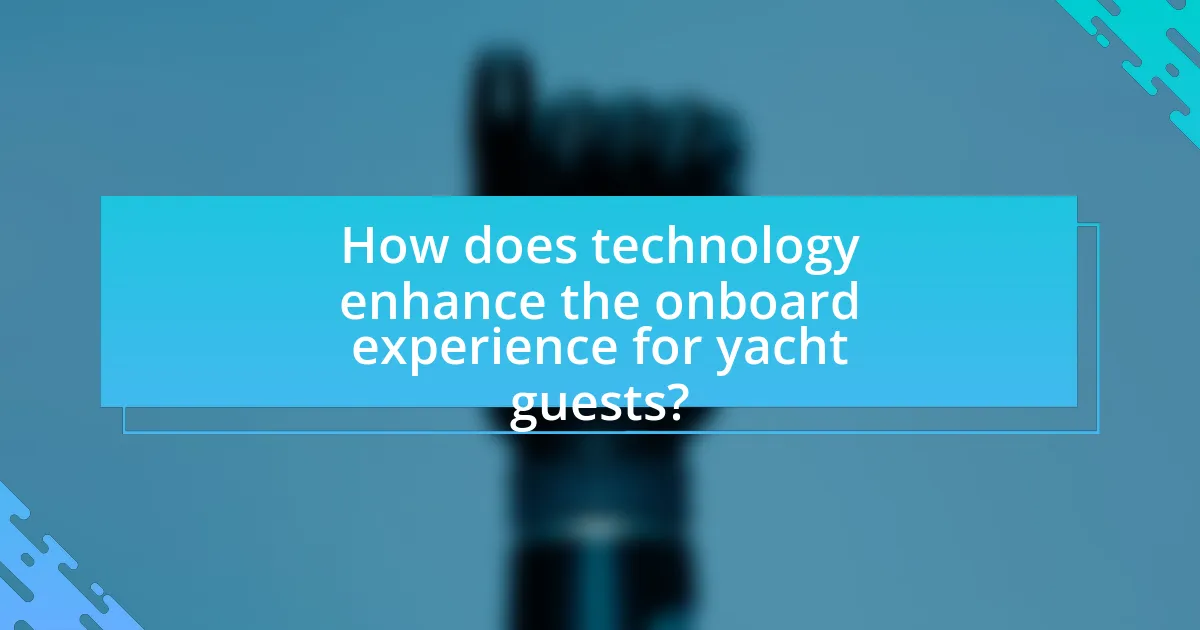
How does technology enhance the onboard experience for yacht guests?
Technology enhances the onboard experience for yacht guests by providing advanced amenities and seamless connectivity. Smart systems allow for personalized climate control, lighting, and entertainment options, ensuring guests can tailor their environment to their preferences. High-speed internet access enables guests to stay connected with the outside world, facilitating work or leisure activities while at sea. Additionally, integrated navigation and safety technologies enhance the overall safety and comfort of the journey, allowing guests to enjoy their experience without concerns. According to a report by the International Yacht Brokers Association, 85% of yacht owners prioritize technology features when selecting a vessel, highlighting the importance of these advancements in enhancing guest satisfaction.
What entertainment technologies are commonly found on yachts?
Common entertainment technologies found on yachts include satellite television systems, high-definition audio systems, and streaming services. Satellite television systems provide access to a wide range of channels, ensuring guests can enjoy live broadcasts even while at sea. High-definition audio systems enhance the onboard experience with superior sound quality for music and movies. Additionally, streaming services allow users to access their favorite shows and movies via Wi-Fi, making entertainment easily accessible. These technologies collectively contribute to a luxurious and enjoyable experience for yacht guests.
How do these technologies enhance guest enjoyment and engagement?
Technologies enhance guest enjoyment and engagement by providing personalized experiences and seamless interactions. For instance, smart devices and apps allow guests to customize their preferences, such as dining options and entertainment choices, leading to a more tailored experience. Additionally, interactive entertainment systems and virtual reality options create immersive environments that captivate guests, increasing their overall satisfaction. Research indicates that 70% of guests report higher enjoyment levels when technology facilitates personalized services, demonstrating the significant impact of these innovations on enhancing the yacht experience.
What innovations in comfort and luxury are driven by technology?
Innovations in comfort and luxury driven by technology include advanced climate control systems, smart home automation, and high-end entertainment systems. These technologies enhance the yacht experience by allowing for personalized temperature settings, seamless control of lighting and entertainment through mobile devices, and immersive audio-visual experiences. For instance, climate control systems can automatically adjust based on occupancy and weather conditions, ensuring optimal comfort. Smart home automation enables users to manage various yacht functions remotely, increasing convenience and luxury. High-end entertainment systems often feature the latest in sound and visual technology, providing guests with a premium leisure experience.
How does technology improve safety and security on yachts?
Technology significantly improves safety and security on yachts through advanced navigation systems, surveillance equipment, and communication tools. Modern yachts are equipped with GPS and radar systems that enhance situational awareness, allowing for precise navigation and obstacle detection, which reduces the risk of collisions. Additionally, integrated security systems, including cameras and motion sensors, monitor the yacht’s perimeter, deterring unauthorized access and providing real-time alerts to the crew. Furthermore, satellite communication systems enable instant contact with emergency services, ensuring rapid response in critical situations. These technological advancements collectively create a safer and more secure environment for yacht owners and passengers.
What are the latest safety technologies implemented in yachts?
The latest safety technologies implemented in yachts include advanced navigation systems, integrated collision avoidance systems, and enhanced fire detection and suppression systems. Advanced navigation systems utilize GPS and AIS (Automatic Identification System) to provide real-time tracking and route optimization, significantly reducing the risk of accidents at sea. Integrated collision avoidance systems employ radar and sonar technology to detect nearby vessels and obstacles, alerting the crew to potential hazards. Enhanced fire detection and suppression systems utilize smoke detectors and automatic fire extinguishing systems to quickly identify and mitigate fire risks, ensuring the safety of passengers and crew. These technologies collectively improve maritime safety and are increasingly adopted in modern yacht designs.
How do security systems protect against potential threats?
Security systems protect against potential threats by employing a combination of surveillance, access control, and alarm mechanisms. Surveillance cameras monitor areas for suspicious activity, while access control systems restrict entry to authorized personnel only, reducing the risk of unauthorized access. Alarm systems alert users to breaches or unusual activities, enabling a swift response. According to a study by the Security Industry Association, effective security systems can reduce theft and vandalism by up to 50%, demonstrating their critical role in safeguarding assets and ensuring safety.
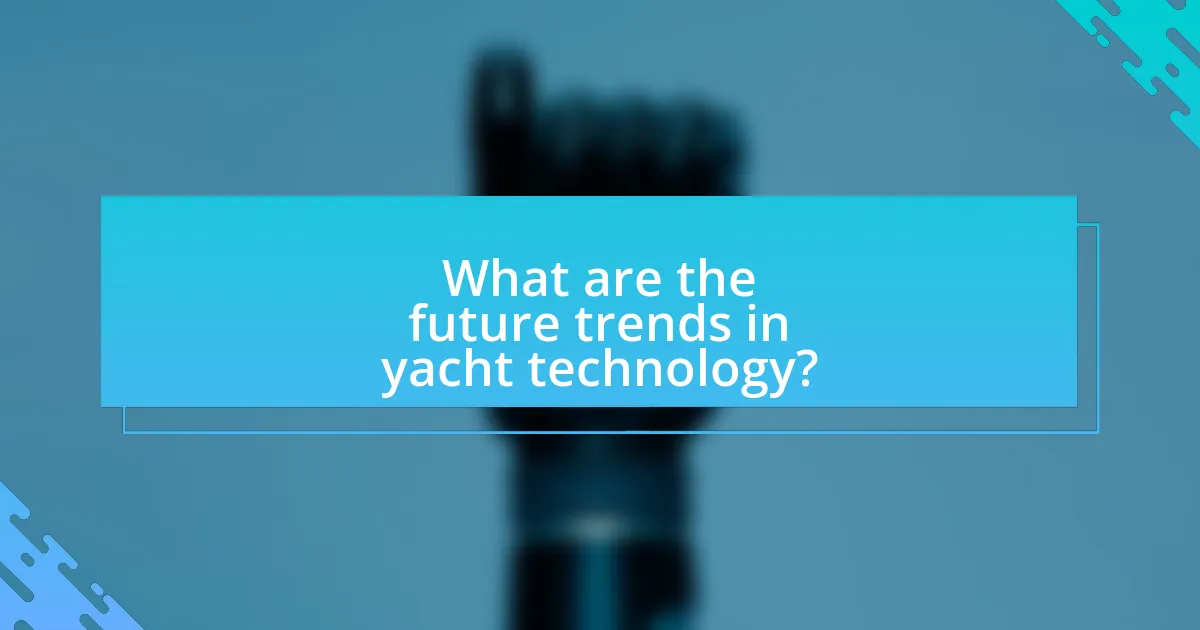
What are the future trends in yacht technology?
Future trends in yacht technology include increased automation, sustainable energy solutions, and advanced connectivity features. Automation is enhancing navigation and operational efficiency through systems like autopilot and smart monitoring, allowing for safer and more user-friendly experiences. Sustainable energy solutions, such as solar panels and hybrid propulsion systems, are becoming more prevalent, reducing environmental impact and operational costs. Advanced connectivity features, including high-speed internet and integrated smart home systems, are improving onboard comfort and entertainment, catering to the growing demand for seamless digital experiences while at sea. These trends reflect a shift towards more efficient, eco-friendly, and connected yachting experiences.
How is sustainability influencing yacht technology advancements?
Sustainability is driving significant advancements in yacht technology by promoting the development of eco-friendly materials and energy-efficient systems. Manufacturers are increasingly adopting lightweight composites and recyclable materials to reduce the environmental impact of yacht construction. For instance, the use of hybrid propulsion systems, which combine traditional engines with electric power, has gained traction, leading to reduced fuel consumption and lower emissions. According to a report by the International Maritime Organization, the maritime sector aims to reduce greenhouse gas emissions by at least 50% by 2050, which has spurred innovation in yacht design and technology. Additionally, advancements in solar panel integration and energy storage solutions are enabling yachts to operate more sustainably while enhancing onboard comfort and efficiency.
What eco-friendly technologies are being integrated into yacht design?
Eco-friendly technologies integrated into yacht design include hybrid propulsion systems, solar panels, and advanced waste management systems. Hybrid propulsion systems combine traditional engines with electric motors, reducing fuel consumption and emissions. Solar panels harness renewable energy, allowing yachts to operate on clean energy while at sea. Advanced waste management systems treat and recycle wastewater onboard, minimizing environmental impact. These technologies collectively contribute to sustainable yachting practices, aligning with global efforts to reduce marine pollution and carbon footprints.
How do these technologies impact the overall yacht experience?
Technologies significantly enhance the overall yacht experience by improving navigation, safety, and onboard comfort. Advanced navigation systems, such as GPS and electronic charting, allow for precise route planning and real-time tracking, reducing the risk of accidents and ensuring efficient travel. Safety technologies, including automated bilge pumps and fire detection systems, provide peace of mind for yacht owners and guests. Additionally, smart home technologies enable seamless control of lighting, climate, and entertainment systems, creating a more enjoyable and personalized environment. According to a report by the International Council of Marine Industry Associations, the integration of technology in yachting has led to increased user satisfaction and safety, demonstrating its critical role in enhancing the overall yacht experience.
What role does artificial intelligence play in the future of yachting?
Artificial intelligence will significantly enhance the future of yachting by optimizing navigation, improving safety, and personalizing the onboard experience. AI systems can analyze vast amounts of data in real-time, allowing for more efficient route planning that considers weather patterns, sea conditions, and fuel consumption. For instance, AI-driven navigation tools can reduce travel time and fuel costs by suggesting the most efficient paths. Additionally, AI can enhance safety through predictive maintenance, identifying potential equipment failures before they occur, thus preventing accidents. Furthermore, AI can personalize the yacht experience by learning passenger preferences and automating services, such as adjusting climate controls or recommending activities based on individual interests. These advancements indicate that AI will play a crucial role in making yachting safer, more efficient, and more enjoyable.
How can AI enhance navigation and operational efficiency?
AI enhances navigation and operational efficiency by utilizing advanced algorithms and real-time data analysis to optimize route planning and resource management. For instance, AI systems can analyze weather patterns, sea conditions, and traffic data to suggest the most efficient routes, reducing travel time and fuel consumption. According to a study by the International Maritime Organization, implementing AI-driven navigation systems can lead to a 10-15% reduction in fuel costs and improve overall operational efficiency. Additionally, AI can automate routine tasks, allowing crew members to focus on critical decision-making, further enhancing the yacht experience.
What potential does AI have for personalizing guest experiences?
AI has significant potential for personalizing guest experiences by analyzing data to tailor services and interactions. By leveraging machine learning algorithms, AI can process guest preferences, behaviors, and feedback to create customized itineraries, recommend activities, and enhance onboard services. For instance, a study by McKinsey & Company found that businesses using AI for personalization can increase customer engagement by up to 20%. This capability allows yacht operators to provide a unique experience that aligns with individual guest desires, ultimately improving satisfaction and loyalty.
What practical tips can yacht owners consider when integrating technology?
Yacht owners can enhance their experience by integrating technology through the use of smart navigation systems, which improve safety and efficiency. Implementing systems like GPS chart plotters and autopilot can streamline navigation, allowing for more accurate route planning and reduced manual steering. Additionally, owners should consider installing onboard Wi-Fi networks to facilitate communication and access to information while at sea, as studies show that connectivity enhances the overall enjoyment of the yachting experience. Furthermore, integrating energy management systems can optimize power consumption, ensuring that essential systems remain operational without draining resources. These practical tips are supported by industry trends indicating that technology adoption in yachting leads to improved operational efficiency and user satisfaction.












